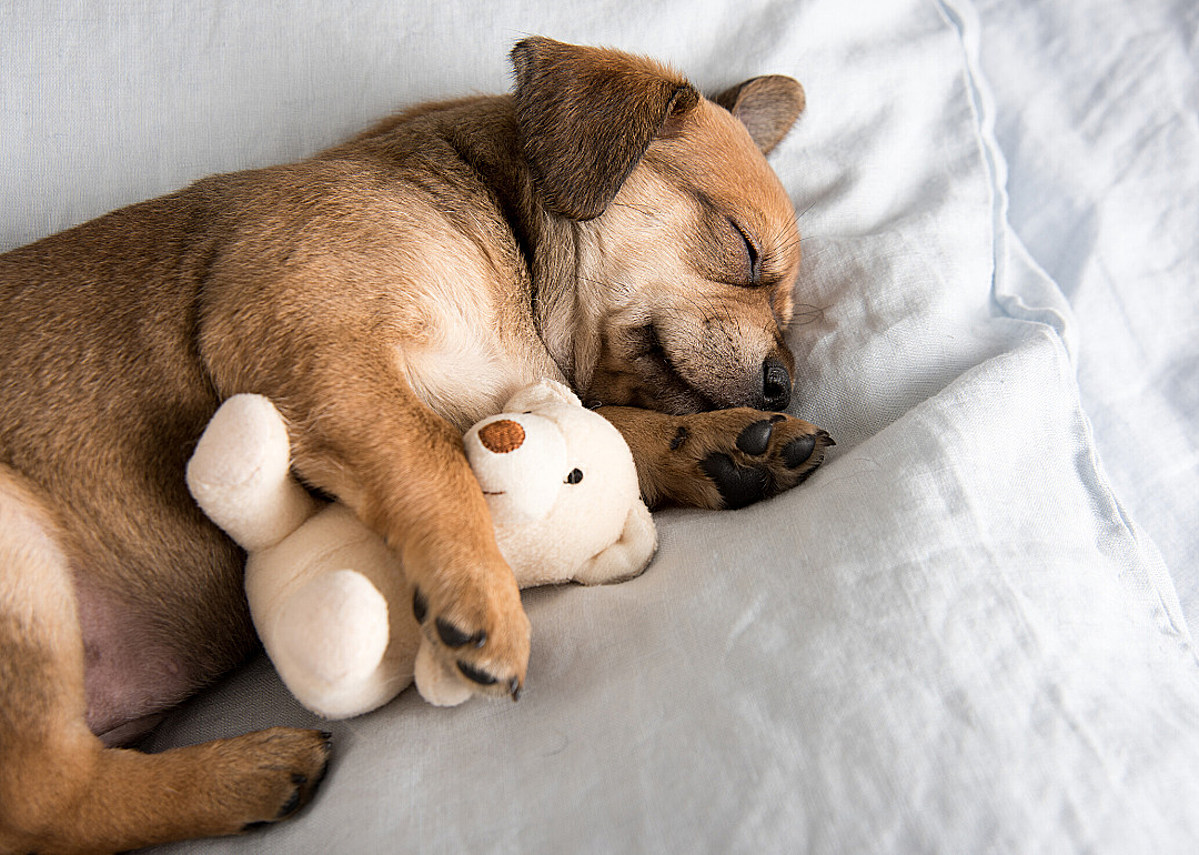
Have you ever found yourself exhausted from sleepless nights with a new puppy? Maybe you’re constantly waking up to whining or barking, or your furry friend can’t seem to settle down for a full night’s rest. The good news is that you’re not alone; there is a solution: sleep training for puppies.
Sleep training establishes healthy habits for your furry friend, from creating a comfortable environment to encouraging consistent sleeping patterns. It’s crucial for your puppy’s health and well-being and can make a world of difference for your sleep and sanity.
Did you know puppies need an average of 18 to 20 hours of sleep daily? That’s a lot of snoozing! Puppies can become irritable, restless, and even sick without proper sleep. On the other hand, consistent and restful sleep can lead to a happier, healthier pup – and a happier, healthier owner too.
In this article, we’ll dive into the ins and outs of sleep training for puppies, from setting up a cozy sleep environment to tackling common challenges like separation anxiety and accidents. We’ll also explore the role of diet in your pup’s sleep habits and provide practical tips and techniques for successful sleep training. So, please grab a cup of coffee (or maybe some warm milk for your puppy), and let’s get started on the path to better sleep for all.
The Importance of Sleep for Puppies
Sleep is as important as exercise, socialization, and nutrition when raising a healthy and happy puppy. Puppies are growing and developing rapidly, and their bodies and minds need plenty of rest to support this growth. Here are some reasons why adequate sleep is crucial for your puppy’s well-being:
Physical Development: Puppies need sleep to help their bodies develop properly. While they sleep, their bodies release growth hormones that support bone and muscle growth. This is especially important during the first few months of a puppy’s life when they experience the most rapid growth. Inadequate sleep during this time can lead to developmental issues and stunted growth.
Cognitive Development: Sleep is also important for a puppy’s brain development. While they sleep, their brains process the information they learned during the day, consolidating memories and building neural connections. This is essential for their learning and cognitive development and can even impact their ability to learn new commands and tricks.
Mood and Behavior: Just like humans, puppies can become cranky and irritable without enough sleep. Lack of sleep can lead to mood swings, anxiety, and even aggression. On the other hand, well-rested puppies are often happier, more relaxed, and better behaved.
Immune System: Sleep is crucial in supporting a puppy’s immune system. During sleep, the body produces cytokines, which are proteins that help fight infection, inflammation, and stress. Without enough sleep, a puppy’s immune system can become compromised, making them more susceptible to illness and disease.
Sleep is essential for a puppy’s physical and cognitive development, mood and behavior, and immune system. As a responsible pet owner, it is important to ensure your puppy gets the sleep they need to thrive. The next section will discuss creating a comfortable sleep environment for your furry friend.
Techniques for Sleep Training Puppies
Regarding sleep training puppies, various techniques and methods can be used. The key is finding the best one for your furry friend and lifestyle. Here are some practical techniques that you can use to help your puppy develop healthy sleep habits:
Establish a Sleep Routine
Just like humans, puppies thrive on routine. Establishing a consistent sleep routine can help your pup feel secure and comfortable. This could involve setting a regular bedtime and wake-up time and a bedtime routine such as a pre-sleep walk or playtime followed by a relaxing activity like snuggling or gentle petting.
Encourage Your Puppy to Sleep Through the Night
If your puppy still wakes up multiple times a night, it’s time to encourage them to sleep. Start by gradually increasing the time between potty breaks during the night. If your puppy wakes up and cries or barks, resist the urge to attend to them immediately. Instead, wait a few minutes before responding, gradually increasing the time interval between responses.
Dealing with Nighttime Whining and Barking
It’s common for puppies to whine or bark during the night, especially if they’re still adjusting to their new environment. However, resisting the urge to give in to their demands is important. Instead, provide comforting reassurance without taking them out of their sleeping area. Over time, they’ll learn that whining or barking won’t result in attention or outside time.
Tips for Daytime Naps
Like with nighttime sleep, consistency is key in daytime naps. Designate a quiet, comfortable spot for your puppy to nap during the day, and ensure they have access to it simultaneously every day. This can help your puppy establish healthy sleep patterns and avoid feeling overtired or cranky.
Use Positive Reinforcement
Finally, it’s important to use positive reinforcement to encourage your puppy’s good sleep habits. Praise your puppy when they settle down for the night or wake up at the designated time. You can also offer treats or toys to reward good sleep behavior.
Remember, every puppy is different, and finding the right sleep-training technique for your furry friend may take some trial and error. However, with patience, consistency, and the right tools, you can help your puppy develop healthy sleep habits that will benefit them for a lifetime.
Common Challenges with Sleep Training Puppies
While sleep training can work wonders for your pup’s restful nights, it’s not always a smooth ride. Here are some common challenges that many puppy owners face during the sleep training process:
Separation anxiety and sleep training
Puppies are naturally social animals and crave companionship, which can make separation anxiety a real issue regarding sleep training. If your pup is used to sleeping with you or nearby, they may struggle with sleeping alone in their crate or designated area. You might hear whining, barking, or even scratching at the door in an attempt to be reunited with you.
To help ease separation anxiety, try gradually getting your pup used to sleeping alone by starting with short periods and gradually increasing. You can also provide comfort items, like a cozy blanket or toy, to help your pup feel more secure. Remember to avoid reinforcing negative behavior by not giving in to their demands for attention.
Accidents during sleep training
As much as we love our furry friends, accidents can happen, especially during the early stages of sleep training. Your pup may have accidents during the night, which can be frustrating and tiring for you and your pup.
Limit your pup’s access to water and food before bedtime to tackle this issue. Also, take them out for a potty break before bedtime and immediately after waking up. During the day, establish a regular schedule for potty breaks and reward your pup for successful bathroom trips.
What to do if sleep training isn’t working
If you’ve tried various sleep training techniques and your pup still isn’t sleeping through the night, it might be time to reevaluate your approach. Maybe your pup’s sleeping environment isn’t comfortable enough, or they have an underlying health issue affecting their sleep.
Consult your veterinarian to rule out any medical issues and consider adjusting your approach. You may need to try a different sleeping area, adjust the temperature or lighting, or switch up the feeding schedule.
You and your pup can overcome these common sleep-training challenges and enjoy restful nights together. Remember that every pup is different and may require a unique approach, so don’t be afraid to experiment and find what works best for your furry friend.
The Role of Diet in Sleep Training Puppies
When it comes to sleep training puppies, many owners overlook diet’s crucial role in their furry friend’s sleeping patterns. Just like humans, puppies’ diets can affect their sleep quality and duration, and it’s important to choose the right foods and feeding schedules to support their restful slumber.
One of the key factors to consider is the timing of your puppy’s meals. Puppies have small stomachs and high metabolisms, so they must frequently eat throughout the day. However, feeding them too close to bedtime can lead to digestive discomfort, disrupting their sleep. Feeding your puppy a few hours before bedtime is recommended to give them time to digest and avoid any midnight tummy troubles.
Certain foods and treats can significantly impact your puppy’s sleep quality. For example, foods high in protein can provide the energy your pup needs during the day, but too much protein before bedtime can keep them awake. On the other hand, foods high in carbohydrates can promote relaxation and help your puppy wind down before sleep. It is important to choose a well-balanced diet that meets your puppy’s nutritional needs while supporting their sleep.
It’s also worth noting that some puppies may have dietary sensitivities or allergies that can affect their sleep. Common culprits include wheat, corn, and soy, which can cause digestive issues and discomfort. Suppose you suspect that your puppy is struggling with food-related sleep problems. In that case, it’s important to consult with your veterinarian to identify any underlying issues and make necessary dietary adjustments.
Choosing the right foods, feeding schedules, and water intake can help ensure your furry friend is well-rested and ready to tackle the day ahead.
Conclusion
Sleep training for puppies is a crucial aspect of puppy ownership that should be noticed. By establishing healthy sleep habits for your furry friend, you can ensure they get the rest they need to be happy, healthy, and well-behaved.
Throughout this article, we’ve explored the importance of sleep for puppies, how to set up a comfortable sleep environment, techniques for sleep training, common challenges, and the role of diet in your pup’s sleep habits. Following the tips and strategies, you can help your puppy develop healthy sleeping habits that benefit you and your furry friend.
So, whether you’re a new puppy parent or a seasoned pro, take the time to prioritize sleep training for your furry friend. Happy snoozing!








